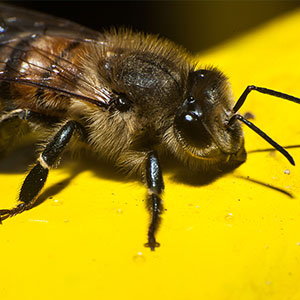It’s unfortunate that many people have misconceptions about pest control and the role of pest controllers. A common assumption is that our primary job is to kill any pest we encounter, but this couldn’t be further from the truth!
At The Pest Master, a professional and ethical pest control company, we dedicate a significant amount of time to educating people about bees. Our policy is to avoid harming bees unless there is an immediate risk to human life, which must be substantiated by a doctor’s letter or similar evidence.
Many of the calls we receive are from individuals claiming to be allergic to bees, often as a precaution rather than a confirmed fact. When people discover bees around their property, they frequently turn to social media for advice, searching for phrases like “how do I get rid of bees” or “how to remove bees”. Unfortunately, they often come across misleading advice such as “don’t call pest control, they will only kill them”.
It’s alarming to read some of the advice given by the general public, as it is usually incorrect. Recommendations like “call a beekeeper”, “don’t harm the bees”, or even “burn them!” are common, with some suggestions being quite disturbing. Most people wouldn’t resort to burning bees or killing them unnecessarily, but some do follow this ill-informed advice. Typically, those dispensing such advice lack experience and qualifications on the subject.
Let’s clear up some common myths:
Are Bees Protected?
No species of bee is protected under UK law, which doesn’t mean you should go ahead and destroy them. There are numerous rules and regulations that pest controllers must follow, especially concerning honeybees.
Beekeepers generally only collect honeybees, and not every beekeeper is willing to remove a bee colony. If any bees are unwell, they risk infecting other honeybees the beekeeper might already have.
Common Bees Encountered by The Pest Master
We frequently come across several types of bees: Bumblebees (white-tailed or red-tailed), Masonry bees, Mining bees, and Honeybees. Each type of bee has different behaviours and requires different handling.
Bumblebees
Bumblebees often find a safe place around your property to have their babies. Once this process is complete, they typically move on. Sometimes they are just visiting your flowers and plants. They can nest in roof spaces and cavity walls without causing damage, and if left alone, they will eventually leave.
Masonry Bees
Masonry bees create holes in cement to lay their eggs and leave once the process is complete. They may cause minor damage to mortar, which can be easily repaired. It’s best to let them be and fill in the holes with mortar after a few weeks of inactivity.
Mining Bees
Mining bees build nests underground, often in soil or grassy areas. The best advice is to avoid these areas if possible, allowing the bees to complete their lifecycle and move on.
It’s essential to correctly identify the species, as wasps also inhabit roof spaces, cavities, and underground. Wasps are much more aggressive than bees.
Honeybees
Honeybees produce honey, typically in cavity walls, chimneys, or roof spaces. Unlike other bee species, they need to be removed if they’ve set up home in your property, as they won’t leave on their own. Their nests grow each year, leading to an increased bee population. However, honeybees don’t have to be killed. Many companies, including The Pest Master, specialise in honeybee removal and relocation. Although it can be labour-intensive and expensive, it’s worth the effort.
Let Bees Live
To reiterate, The Pest Master does not kill bees unless there is a risk to human life. Over the years, we have handled thousands of bee-related jobs, investing countless hours in advising and educating customers about the beauty and importance of bees. While some bees can sting, they generally do so only as a last resort, unlike wasps.
Our advice, as an ethical and professional company, is to dispel the myth that pest controllers indiscriminately kill pests. When selecting a pest control company or seeking advice, ensure the company’s first approach is not to kill but to find a humane solution.
Choosing a knowledgeable and ethical pest control company like The Pest Master ensures that bees are handled with care and respect, reflecting their crucial role in our ecosystem.


